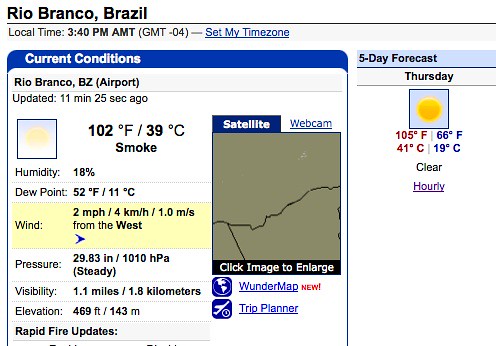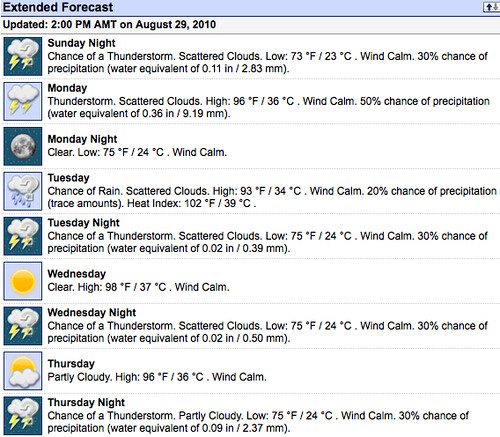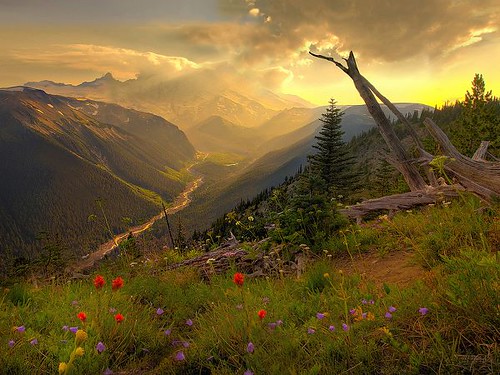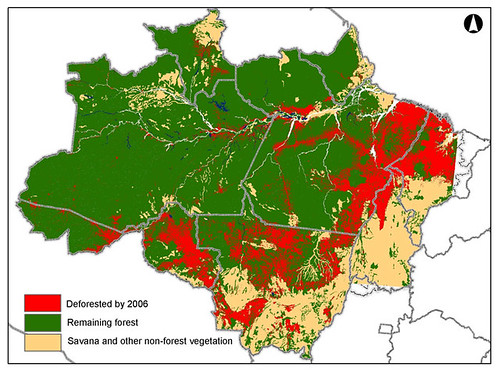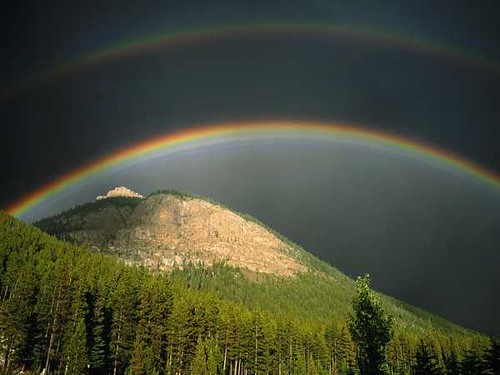WHY MARINA SILVA MATTERS
FOR THE FUTURE

Collage by Carmen Chagas
Luiza Mello Franco (a researcher and writer for the Council on Hemispheric Affairs) takes an in-depth look at the presidential election in Brazil.
Money quote:
The environment remains a tough political sell in Brazil. There is more to Brazilians’ suspicion of environmentalists than an evil conspiracy by powerful interest groups. People’s lives are getting better. In the very short term, the majority of the population will not suffer if, for example, ranchers receive a virtual amnesty from deforestation. There is no reason to change a team that is winning, as goes a Brazilian football analogy. It will be difficult, and it will take generations to convince Brazilians that if the environment is left out of the strategy, the team will only win the first match.
A growing number of young people see it differently, and that's the start of a movement which is the difference that holds the political demand for a less distant and yet different future. Marina Silva has been unique among leading Brazilian politicians in asking that Brazil think about winning the series rather than only the first match. With calmness, clarity and wisdom, she speaks to and for that future.
Brazil – The Environment, Lula and Marina Silva. “There is nothing as powerful as an idea whose time has come”: Marina Silva’s Unwinnable But Noble Bid for the Brazilian Presidency, and Why it Matters
When Marina Silva was still Brazil’s environment minister, she took a trip to the Xingu River in the Amazon. On the day she began her travels, José Dirceu, President Lula’s incorrigible former chief of staff, invited Germano Rigotto, the governor of Rio Grande do Sul, to fly to Brasilia. The governor has strong ties with agribusiness, and his political clout would be useful in lobbying for transgenic crops. Dirceu’s invitation was strategic– he wanted to make the most of Marina’s absence. The event shows how far Marina, the Green Party’s (PV) presidential candidate in the October 3rd elections, has taken the environmental debate in Brazilian politics. Although her cause – the environment – has gained momentum due to its urgency, Marina has no prospect for winning the presidency. Her voter base is composed of a number of small, disparate interest groups, who gravitate towards her for different reasons, a concern with the environment being only one of them. Nevertheless, Marina Silva’s presence in the campaign is as significant as the result of the elections. To talk about her is to talk about the conundrum Brazil is facing as its economy grows, the environment – to a vital extent the source of such growth – is threatened and the country’s role in the world becomes more and more central. She deserves the attention of anyone implicated or merely interested in Brazil’s future.
Reminiscing About the Present
These are interesting times for Brazilian politics, times when a desire for more of the same coincides with demands for radical change, with both waves stimulated by the same factors: stability and growth. The statistics of social progress in Brazil are remarkable. The number of people living in poverty has fallen by 20 million under Lula, from 49.5 million (or 28.5% of the total) in 2003 to 29 million (16% of the total population) in 2008, according to calculations by Marcelo Neri, a social-policy expert at the Rio de Janeiro based Fundação Getulio Vargas. Even allowing for an expected slowdown, the economy will have grown by about 8% in the year before the elections in October. Inequality, a plague in Brazil, is also declining: according to The Economist magazine, the Gini coefficient, a standard statistical measure of inequality, has fallen steadily since 2001 (though it remains very high by international standards). When the economy is doing this well, it is difficult for voters to accept that there is room and need for change. Most Brazilians will vote for Dilma Rousseff or José Serra, the two mainstream candidates who will maintain Brazil’s orthodox development strategy. Fewer voters see Marina’s environmentally-conscious development ideas as the best way to guarantee the continuation of the present level of growth in the long term. They see that times are good but the status quo is not. There is also a dimension of political protest to her success: many of her voters are disillusioned with the Worker’s Party (PT) record, and they see in her candidacy a chance to make their voices heard. The less cynical of these also find in her political character the kind of moral uprightness that gives legitimacy to politics in a time when politicians have little credibility with the public. Regardless of why voters chose her as their candidate, she now has a platform to defend and increase the visibility of environmental sustainability.
Political circumstances and her resignation from PT in 2009 have made the association between Marina and Lula impossible. It is curious nonetheless that Dilma Rousseff, and not Marina, was selected as Lula’s successor. After all, Lula and Marina have similarly moving backgrounds and their political lives are intertwined: they are both founding members of the PT. Marina was born in poverty, in a community of rubber-tappers in the state of Acre. As such, she was part of the political wave that brought the plight of the poor to the political mainstream. She once said, “Now that the people are no longer afraid to vote for a ‘Silva’ they can carry on voting for a ‘Silva’ – but this time, Marina”. Silva is possibly the most ordinary Brazilian name, like Smith is to English-speaking countries. In any case, it is to Rousseff that Lula has chosen to transfer his popularity. Roussef’s biggest rival, José Serra, was part of Fernando Henrique Cardoso’s administration and has been in the opposition ever since Lula became president. Regardless of their varying degrees of personal closeness to Lula, Rousseff and Serra had to focus on the same question: how to maintain and add to Lula’s legacy. Environmental concerns are secondary in both of their political agendas. Marina is not necessarily critical of the way Lula has run the country, nor is she critical of him personally (at least not in public). She does, nevertheless, profoundly differ from Rousseff and Serra in that she focuses not on perpetuating the present, but preparing for the future. This means preserving some of the current administration’s initiatives because these have been beneficial and there is still room for them in her vision of Brazil’s future. But it also means radically altering others, especially regarding the environment. She wants to reshape the way the country sees the environment because she believes that environmental woes prevent Brazil from realizing its full potential.
It is Not About Tree-Hugging
Despite challenges from skeptics, scientific evidence is solidly on the side of environmentalists – NASA and the UK Met Office recently released convincing data that proves the rise of long-term world temperatures. Moreover, never have the flaws in the way we obtain energy been more evident. The environment is unique in international affairs because sustainability is in the interest of every nation. But no other country is as profoundly implicated in both the problems and the solutions as is Brazil. Brazil possesses most of the Amazon, “the world’s lungs”; because of the abundance of natural resources Brazil is also in an ideal position to deal with the energy challenges of the modern world. It is odd, therefore, that environmentally-friendly policies are portrayed as a burden rather than as an asset to Brazil’s rise to international prominence. Environmentalism is a multifaceted movement, with varying degrees of credibility, but Marina advocates for its most serious side. She puts her finger on the only way we can avert crises: to address their structural causes, a process only governments can initiate. Environmentally concerned individuals may be drawn by anxiety to make choices in their daily lives that protect, or at least cause less damage to the environment. Unfortunately, their efforts will not have a significant impact if big decision-makers opt in favor of the status quo.
As Marina sees it, when it comes to the environment, especially the Amazon, inevitable doom and opportunity are two sides of the same coin. The way Brazil handles its resources will define whether the country will save the world or allow it to go under. In a Financial Times interview in 2009, she distanced herself from the political mainstream:
“Changing the model of development pre-supposes risk, including in relation to public opinion. I think that unfortunately the parties and Congress, and the executive, are trapped in the status quo and are incapable of the vision needed to make the change.”
Marina feels compelled to take this risk for ethical and sentimental reasons, but also for practical ones. Policy-makers fail to take into account environmental costs — the economy depends on biodiversity, so jeopardizing the environment is counter-productive. In an interview with Jô Soares, a prominent talk show host, Marina said that 50% of the GDP of developing countries depends on biodiversity. “Who in their right mind would want to destroy 50% of their GDP?” she asked in bewilderment.
Hands Tied at the Ministry
Her experience as Lula’s environment minister sheds light on the frustration in Marina’s tone. She resigned in 2008, and in the following year she also left the PT. A description of her time in office illustrates how far the political consensus is from her vision of Brazil. Marina resigned following a succession of disputes with fellow ministers and businessmen who accused her of stalling major development projects in the Amazon and of hindering the Brazilian economy. In her first years as minister, it seemed like she would achieve much of what she had aspired for: a plan called Legal Amazon reduced deforestation by 57% in its first three years. However, by 2007 she had become politically isolated. In that year, the government blamed her for the slow implementation of the Growth Acceleration Program (PAC). Tensions rose further when satellite images showing a sudden spike in deforestation came to Marina’s attention. She called a press conference, where she partly blamed soy farmers for the destruction. Lula was furious. She described the rise in deforestation as a “cancer”; he rebutted that it was an “itch”, at most a “little tumour”. In a move seen as a final insult to her, Lula picked Mangabeira Unger, who is known for his controversial ideas of development and industrialization, to be the head of a new sustainable development scheme for the Amazon. Meanwhile, a group of politicians – including Blairo Maggi, one of the world’s largest soy producers – mounted a lobby to overthrow measures that banned banks from lending money to fund projects in areas of illegal deforestation. Something had to give, and Marina resigned.
To be fair, even environmentalists sometimes question Marina’s attitudes. Fabio Olmos, an environmental consultant, criticized her for being too inflexible: “Things like transgenic foods or stem-cell research should be tested and authorized or vetoed based on test results. She belongs to the team that doesn’t even want to test these things.” Marina’s ethical stand is a double-edged sword. Many admire her for it, but she is often criticized for being too messianic. According to critics, the flipside of her idealism is her unyielding personality. Her moral uprightness and unwavering defense of her ideas do not make her exactly confrontational, but they do polarize debates. When she was first appointed minster, many feared that Lula had chosen her to signal, especially to the international community, that his administration was serious about the environment when in fact his commitment was merely rhetorical. This analysis may be simplistic, but it is true that the very qualities that make her a darling of international environmentalists – her militant pose and seriousness of purpose – also make her seem reclusive and inflexible. Her opponents are unwilling to discuss some of her ideas simply because they are hers. For example, it is telling that Jose Serra had to be the public face of a project she designed to subsidize rubber plantation; Congress passed it, but it probably would not have passed it if she had been the one to defend it in Congress. Moreover, her principled approach to politics gives her an outsider status that leads some to argue that she was politically weak – disjunctive personal qualities become political liabilities. Although there may be something to these arguments, ultimately they say more about the accusers than about Marina’s putative faults.
An Amazonian Riddle
The political climate was tense when Marina was at the ministry. Debates between agribusiness and environmentalists are always tense because the stakes are high for both sides, particularly when the subject is as touchy as the fate of the Amazon. Throughout Brazil’s history, public opinion has shifted from considering the Amazon’s conquest successful and even heroic (when the government called on people to populate and control an empty region) to regarding it as an environmentally criminal act. All this time, however, its occupation model has remained the same. Any talk of change is politically sensitive because the occupiers of this vast land were encouraged to move there in the first place. Lula’s government, like its predecessors, has tended to sympathize more with this variety of voters than with environmentalists.
At the same time, political clout still lies with agribusiness. The bancada ruralista, an informal block of representatives who defend agricultural interests, make up 20 – 25% of Congress, according to political consultant João Augusto de Castro Neves. Their hegemony is dangerous because the status quo that they so ardently defend is based on unsustainable deforestation. In Tailândia, a town in Pará surrounded by sawmills, about 70% of the population depends on logging in some fashion, according to local officials in the state’s finance ministry. Logging is only a part of a cycle of activities that, taken together, intensify deforestation. Loggers work with farmers: once loggers clear an area of trees, cattle farmers sow grass and raise cattle, and when the land is exhausted for pasture, it passes on to another category of farming. There are even financial incentives to participate in this process, because ranchers often sell the land they have deforested to another user, even though they do not legally own it. This cycle is highly inefficient: as The Economist has reported, a recent study of some 300 municipalities in the Brazilian Amazon, published in the latest edition of Science, shows that deforested areas enjoy a short economic boom, then quickly fall back to previous levels of development and productivity as the frontier advances. The Economist adds that deforestation also reduces the rainfall on which Brazil’s agriculture depends. Because of this inefficient and exploitative system, many soybean exporters have pledged not to buy Amazonian soy. Stopping this system is not just a question of ethics, but of determining the future of agriculture. Destroying the entire forest is not an option. Marina has been right to place deforestation of the Amazon, and the harmful development linked to it, at the centre of attention, and no matter how adamant she may sound to some, all must give her credit, if only for bringing home the seriousness of the problem.
Despite massive resistance to Marina’s ideas, there are signs that people from all sides of the debate are aware that something needs to change. Aldo Rebelo, a federal deputy, has proposed legislation to legalize land occupation. Marina has called the project “environmental embezzlement.” The idea is to legalize land ownership by squatters who have deforested the land they occupy. This reeks of environmental amnesty. The landowner would, nevertheless, have to commit to maintaining the size of farms (preventing expansion and further deforestation). The government claims that the legislation will enable it to discover which farmers are operating on illegal land and in the informal economy. The trouble is, the new system will be very difficult to enforce, and the outcome is likely to be an increase in deforestation. Roberto Smeraldi of Amigos da Terra, an NGO, worries that “this is not something that is feared as a serious threat by people who break the law”.
The solution that Marina and other environmentalists have proposed is to provide these land occupiers with another source of income, such as commercializing forest products. It is to this end, among others, that Norway has donated 1 billion USD to the Amazon, for which Marina’s ministry set up the Amazon Fund. This money creates momentum to alter the Amazonian economy and introduce new, non-exploitative activities. Norway’s initiative also calls attention to the responsibility of developed countries to help contain deforestation. Years of growth based on high emissions have made developed countries indebted to the environment, so now it is only fair that they take an equally active role in protecting it. On the other hand, it will take more than creating alternative economies to stop deforestation, and some form of environmental intervention is necessary to develop the local economy. As The Economist points out, the discussion right now is not so much about how to stop deforestation, but about how to slow it down.
Have the Cake and Eat it Too
Critics paint Marina as a tree-hugging environmental populist. In fact, a detached analysis of her speeches brings out different, more moderate perspectives. She is far from suggesting that growth should be sacrificed for the sake of the environment. She advocates that “there is no need to abandon environmental responsibility in order to promote growth.” After all, her ministry licensed some of the Lula administration’s most ambitious pro-growth projects. To begin with, it approved of the inter-basin transfer of the São Francisco River. Also, important parts of the hydroelectric dam complex, the Belo Monte Dam, were given the go ahead under her watch (although she is now critical of the direction the project is taking). Finally, her ministry allowed the construction of BR-163, a highway that runs from Cuiaba in the southern part of Mato Grosso to Santarém in the state of Pará. What Marina is trying to do is to make Brazilians understand that they do not have to choose between the environment and growth – that the two are reconcilable.
She Won’t Win, so Why Care?
Marina is certainly not expected to win the presidential elections, so raising the profile of sustainability will be the most significant and lasting outcome of her run for president. Brazilians are not typically environmentally conscious, simply because for many of them, short-term survival is the priority – when tomorrow is uncertain, the future is irrelevant. Still, her campaign has acquired a kind of inspired support base that is rare in Brazilian national politics. She may not belong to any of the mainstream parties, and she definitely lacks the funds for a successful campaign, but she has something all other candidates long for: the devotion of young people. Their enthusiasm is comparable (in fervor, though not in numbers) to the excitement of young American voters in the 2008 presidential campaign. These people see the environment as an overwhelmingly motivating political cause. A spontaneous grassroots campaign has sprung from this group of mostly middle and upper-middle class young people. They are responsible for Movimento Marina Silva, whose website has more than 20,000 subscribers. As minister, her achievements in defending the environment were momentous, but they are also reversible. The best way to safeguard them is to make voters understand their importance. Polls indicate that she will not be Brazil’s president for the next four years, but the impact of her campaign has the potential outlast a presidential term.
That being said, the truth is, it is not just a lack of political clout or adequate campaign funds that prevent her from winning the presidency. The environment remains a tough political sell in Brazil. There is more to Brazilians’ suspicion of environmentalists than an evil conspiracy by powerful interest groups. People’s lives are getting better. In the very short term, the majority of the population will not suffer if, for example, ranchers receive a virtual amnesty from deforestation. There is no reason to change a team that is winning, as goes a Brazilian football analogy. It will be difficult, and it will take generations to convince Brazilians that if the environment is left out of the strategy, the team will only win the first match. Marina once quoted Victor Hugo saying “there is nothing as powerful as an idea whose time has come.” We are witnessing the baby steps of this idea, and how fast it will develop is still uncertain. What is certain, though, is that Marina is on the right side of history.
Go to original article.

